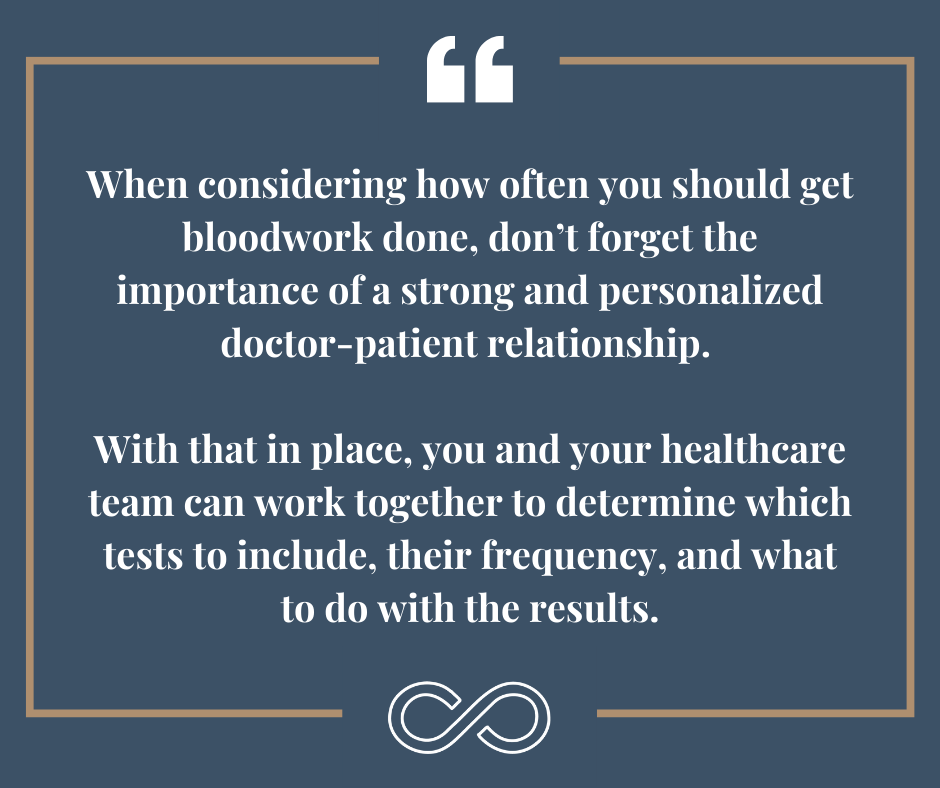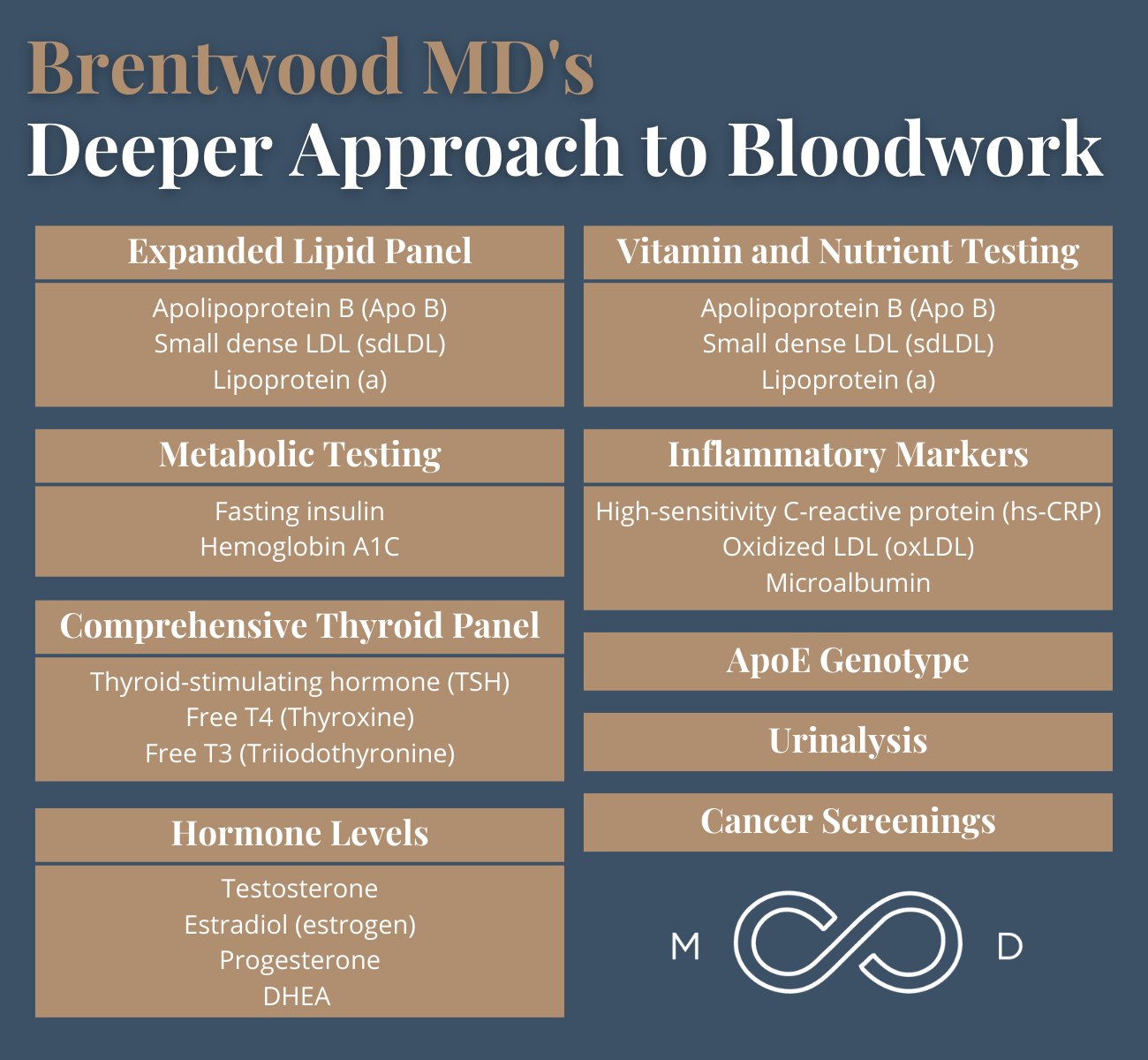Cholesterol. Triglycerides. Glucose. These are all key indicators of your health, and they can be incredibly helpful for assessing your risk of certain conditions, like heart disease and diabetes.
And you can check on the amounts of these substances circulating in your body at any time just by getting a simple blood draw.
With that in mind, how often should you get bloodwork done?
I’m going to give a couple answers here. The first is the simple, absolute baseline answer, and the second is more personalized.
For the first answer, the absolute baseline for how often every human should get bloodwork done is once per year. Really, the goal is to establish a regular rhythm with your doctor, and once per year is the absolute maximum time that can elapse for that to be effective.
The second answer is, predictably, it depends on YOU. What are your unique qualities? What are your risk factors and health history? Would it be beneficial for you to get a full blood workup more often — say, every six months, or quarterly?
So, bloodwork should be performed at a minimum each year, which can coincide with a classic annual physical. But depending on what you’re looking for and your unique health priorities, more frequent testing may be an appropriate proactive approach to managing your health.
What Does Bloodwork Measure?
A bare-bones blood workup that you’d get through any traditional, fee-for-service practice typically includes the following:
- Complete blood count (CBC)
- Comprehensive metabolic panel (CMP)
- Lipid panel (cholesterol and triglycerides)
Results from these tests provide important information about five main areas: kidney function, liver function, blood cell function, blood sugar, and cholesterol.
While this group of tests is the foundational recommendation for bloodwork from a population health perspective (and driven by insurance), it really isn’t enough to provide a reliable picture of your health.
Population health bases recommendations on what most people of a certain age, sex, and health history require to stay alive. What it cannot take into account is each patient’s personal story.
Population health recommendations fail to consider many important variables, like:
- Detailed family history of health conditions
- Habits and lifestyle choices, including factors like alcohol use and smoking
- Environmental exposures
- Weight history, including weight-related risk from your past
This is where blood panels need to be much more individualized, and where concierge practices can go deeper than traditional practices. In addition to baseline factors like age, sex, and weight, we have the time and freedom to investigate your full health story, and test accordingly.
A Deeper Approach to Bloodwork
Here at Brentwood MD, we of course provide the basic testing mentioned above, but we also recommend additional bloodwork for most patients. These additional tests provide us with a much more detailed and individualized picture of each member’s personal health, and a better assessment of risk factors.
By category, our more extensive testing typically includes:
An expanded lipid panel. We recommend the following cholesterol-related tests for a more specific assessment of cardiovascular risk:
- Apolipoprotein B (Apo B)
- Small dense LDL (sdLDL)
- Lipoprotein (a)
Metabolic testing. We look at these factors to uncover the presence or likelihood of insulin resistance and metabolic syndrome.
Comprehensive thyroid panel. A complete thyroid panel investigates for insufficient amounts or function of this endocrine system:
- Thyroid-stimulating hormone (TSH)
- Free T4 (Thyroxine)
- Free T3 (Triiodothyronine)
Hormone levels. We get a clear picture of the health and balance of important hormone levels, such as:
- Testosterone
- Estradiol (estrogen)
- Progesterone
- DHEA
Vitamin and nutrient testing. Since it’s not uncommon for people to be depleted or deficient in certain crucial nutrients, we test for the most common culprits, such as:
- Vitamin B12
- Vitamin D3
- Calcium
- Magnesium
Inflammatory markers. These tests reveal signs of vascular inflammation, which negatively impacts the body’s internal environment. Like weeds in a garden, chronic inflammation harms your body’s ability to function and thrive. We look at:
- High-sensitivity C-reactive protein (hs-CRP)
- Oxidized LDL (oxLDL)
- Microalbumin
Apolipoprotein E (ApoE) genotype. Recent scientific data shows a link between certain genetic factors and an elevated risk of developing conditions like cardiovascular disease and Alzheimer’s dementia.
Urinalysis. Though you can’t see it with the naked eye, microscopic blood or protein can end up in your urine as a result of kidney damage or vascular inflammation. We recommend routine testing to detect this as early as possible.
Cancer screening. Though regular testing of a prostate-specific antigen (PSA) level fell out of favor in population health recommendations, we continue to recommend personalized, regular PSA monitoring to screen for prostate cancer in men.
Additionally, more comprehensive cancer screening tests are available for men and women, such as Grail’s Galleri screening, which we discussed in a prior blog post.
This additional testing provides a more comprehensive look at a person’s health and risk factors for disease, allowing us to make personalized recommendations for their care. Depending on each individual’s story, we may recommend more or less testing than what’s listed here.
Can You Just Do Bloodwork Online?
Some people are interested in online blood testing services that offer similar panels to our standard workup. And you certainly can use them, but here’s the hitch: You know Google, but Google doesn’t know you.
What do I mean by that? The value in these blood tests isn’t just getting a lot of information sent to you by a machine. It’s having a trustworthy, reputable interpretation of your results.
When you’re making plans for your personal health, data alone isn’t enough. You need to know how those results matter in the context of your health story and how you can connect them to specific, effective action.
Part of why I so highly value concierge practice is the opportunity we have to develop a strong personal relationship with our members. This personal connection lets us interpret test results in context and offer members insight into which numbers matter a little and which context matters a lot. We provide a frame of reference for where the worthy health investments should be made.
Regular Assessment, Accountability, and Lifestyle Management
Contextualized interpretation isn’t the only reason to develop a strong relationship with your doctor and maintain regular testing. Ongoing feedback and accountability are perhaps equally valuable.
For example, perhaps you make a notable lifestyle change, maybe in your diet, based on your initial test results. Your doctor can give you an idea of when you can expect to see changes in your numbers and how often you should get follow-up bloodwork done. Together, you and your doctor can use that follow-up testing to monitor your results and gauge your progress.
Whether you’re looking to lower your blood glucose, raise your HDL, or anything else, these regular check-ins with your doctor help hold you accountable for making meaningful change. They can also be a source of encouragement and proof that a strategy is working, even if you can’t yet see it. On the other hand, if a strategy is falling short, they provide the evidence to reassess to make adjustments.
How Often Should You Get Bloodwork Done: Final Thoughts
When considering how often you should get bloodwork done, don’t forget the importance of a strong and personalized doctor-patient relationship. With that in place, you and your healthcare team can work together to determine which tests to include, their frequency, and what to do with the results.
Then, as you work to optimize your health, regular testing will help keep you on track and showcase your success.


Dr. Wright joined Brentwood MD in 2022 as the model allows him to spend more time connecting with patients and build a foundation of exceptional care. He is a Nashville native and completed his family medicine residency at the University of Tennessee Health Science Center, where he also served as Chief Resident. He believes that your health deserves a prominent position on your priority list, and would be honored to serve you and your family.








